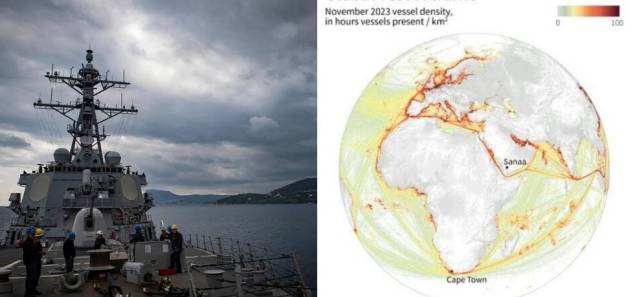The US condemned what it called “unprecedented” attacks on ships in the Red Sea by Yemeni rebels. On Tuesday, the Huthis promised to keep up their military operations even though a new maritime security force was announced.
The rebels have been attacking with drones and missiles. The most recent attack was on Monday and targeted two ships. These attacks are threatening to disrupt global trade, and major shipping companies have stopped all traffic through the Bab al-Mandeb strait.
On Tuesday, Pentagon chief Lloyd Austin said that the attacks “threaten” the free flow of trade. This came one day after he announced that a multinational task force would be formed to stop Huthi attacks with missiles and drones.
In a statement, Major General Pat Ryder, the press secretary for the Pentagon, said, “Secretary Austin condemned Huthi attacks on international shipping and global commerce as unprecedented and unacceptable. He also said that the attacks threaten the free flow of commerce.”
Read More: Iran’s Oil Minister Says Gas Stations Have Been Hacked
It was said that Austin talked with people from 43 countries, as well as the European Union and NATO, in a virtual meeting about the growing threat to marine security in the Red Sea.
The head of the Pentagon “urged participants to join US-led and other international initiatives… to restore security in the Red Sea to deter future Huthi aggression,” the statement said.
He announced the task group on Monday. It is made up of the United States, Britain, Canada, France, Italy, the Netherlands, Norway, and Spain.
It made the Huthis angry, and rebels promised to keep attacking.
Mohammed al-Bukhaiti, a senior Huthi official, said on X (formerly Twitter), “Even if America is able to get the whole world to work together, our military operations will not stop… no matter what sacrifices it costs us.”
Mohammed Abdul Salam, a spokesman for the rebels, said, “The US-formed coalition wants to protect Israel and militarize the sea.” He also said, “Whoever wants to make the conflict bigger must face the consequences of their actions.”
The Pentagon says that the Huthi rebels in Yemen have attacked 10 merchant ships from more than 35 different countries with more than 100 drone and missile attacks.
They took over the Galaxy Leader commercial ship in November and held its 25-person crew hostage. The ship and its crew are still in Yemen.
It’s hard to stop
On Monday, the rebels said they attacked two ships in the important trade route between Asia and Europe. One of the ships was the Norwegian-owned Swan Atlantic.
The US Central Command said that the Swan Atlantic “was attacked by a one-way attack drone and an anti-ship ballistic missile launched from areas in Yemen controlled by the Huthis.”
That the guided missile destroyer USS Carney “responded to assess damage” was what it said.
The bulk cargo ship MV Clara reported a blast in the water near where they were at about the same time, CENTCOM said.
It also said that no one was hurt in either attack.
Because insurance costs have gone up so much, big shipping companies are now sending their ships around the southern tip of Africa, even though it takes longer and uses more fuel.
A.P. Moller-Maersk, a Danish company that handles 15% of the world’s container freight, is one of the big shipping companies that has stopped trips in the Red Sea until further notice.
The government said in a statement on Tuesday that “all vessels previously paused and due to sail through the region will now be rerouted around Africa via the Cape of Good Hope.”
At the time, “Maersk had approximately 20 vessels that had paused transits, out of which half were waiting” .
Analysts say that the maritime task force that Washington named won’t be able to stop attacks by the Huthi rebels, who have a lot of weapons like ballistic missiles, cruise missiles, and drones.
Andreas Krieg, a professor at King’s College London, told AFP, “The Huthis have a large collection of different drones and missiles that they can use… and some of them will be hard for a normal navy ship to stop.”
The danger to shipping is made even greater by the group’s ability to use anti-ship mines and coordinate operations with boats and helicopters, according to Torbjorn Soltvedt of the risk intelligence company Verisk Maplecroft.
What do you say about this story? Visit Parhlo World For more.


